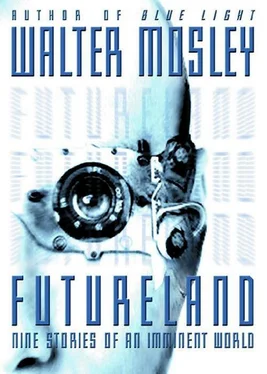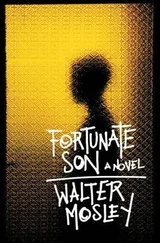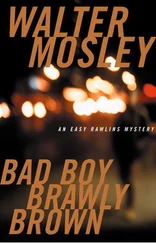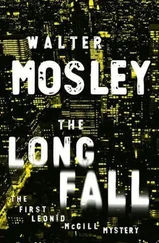Johnson nodded.
Neil was wondering why he had never asked about Blue Nile’s family or his work contract with MacCo; why he’d never known that his friend lived in a labor dormitory or why he’d never been invited to call him Blue.
“It’s not so bad,” Blue Nile said. “Before I made the deal and got the nuclear drugs my mother was in a full-out coma. She came awake and smiled at me six hours after her first dose. We moved her down to Brooklyn and she stayed with my sister. I saw her every day for those three years. It was worth every minute I have to spend.”
“Yeah,” Folio said. “For you it was. For anybody. Life is worth almost any price you have to pay. But that doesn’t mean they have to charge you for it.”
“You’re right about that,” Blue Nile said. “And right is right.”
They talked all night and into the morning. Blue Nile had a flask of real brandy that D’or produced glasses for. Blue Nile and Folio and D’or did most of the talking. Neil just listened. It was rare that he was with a group of people who spoke openly and honestly about their feelings. For the first time in many weeks he forgot completely about Nina.
Blue Nile became a regular at the China Diner. Neil would see him at the counter almost every time he went there. The older man was always talking to D’or or waiting for her to be finished so they could resume their conversation. One time Neil ran into Nile at breakfast wearing the same overalls he had on the day before.
Neil always sat alone to give D’or and Blue Nile their privacy. Every now and then Folio Johnson, another regular, would wave him over.
One day the detective seemed down and Neil took it on himself to pull up a chair.
“Something wrong, M Johnson?” Neil asked.
“Had a case didn’t work out right.”
“You failed?”
“I got the answers but my client died. He was murdered by a girl.”
“Oh.” Neil wondered how he could switch the subject.
“Don’t worry, kid,” Johnson said, as if he could read Neil’s worried mind. “Cops know all about it. They know but they can’t do a thing.”
“Why not?”
“Same reason that it’d be a crime for Blue to quit his job. The corporations. The madmen who run ’em.”
Neil swallowed hard and sat very still.
“You know anything about the Itsies, kid?”
“No. Just that they believe that the Nazis back a hundred years ago were right: that there’s a wedding of the scientific and the spiritual, like with Infochurch.”
“Do you know any of them Itsies?”
“No sir. No.”
“They wanna kill me.”
“Why?”
“ ’Cause I’m black. Can you believe that? In this world where the last thing you got to worry about is skin color and they still wanna kill me. That’s some crazy shit.”
Neil didn’t see Folio Johnson around the China Diner much after that night. He missed their talks but he was also busy, spending long days at GP-9. He designed seventeen micronic processors — wafer-thin microdots containing billions of hard gel circuits, sheathed in the multilayered silicon skins needed to perceive and encode sensory data and to transfer those translations into the nervous system code.
The Third Eye would be able to perceive far more than human senses. A user could, Neil believed, close his eyes and plug his ears, wrap himself from head to toe in sense-dep clothes, and still be able to know more of what was going on around him than ten unaided human beings.
But as large as the micronic memory was, it was nowhere near the capacity needed to record these sensations for later use. At full capacity a human would be able to use the eye only one sense at a time. He could see clearly for miles distant, but his other senses would suffer. The only way to be aware of all senses would be to record them for later study. In order to record this data successfully, the table computer estimated a trillion trillion characters of memory per hour.
Creating a functioning device, Neil felt, was impossible. But he wasn’t worried. His job was to develop the virtual prototype for the perceptor logic, and he had done that; at least, he had the general designs down. It would take another three or four years for him to locate and download all the routines that would fit in between the sheaths of the Third Eye.
Neil often thought about his old days on the prod lane, days when all he would do was look up one of the few hundred chips he used in product insertion. He never worked on a project for more than ninety minutes. He’d never known how anything turned out unless he happened to see the device in one of the leasing department store vid commercials.
“What you thinkin’?” Nina asked him one day. They were sitting side by side, looking out at the sky.
“Why don’t more people do what we’re doing here?” he asked.
“Because the corporations don’t want ’em to.”
“Why? The kind of work we’re doing could change the way people live.”
“You really think so?”
“Sure. With this device, when they finally figure out the memory, you could just go outside and see the planets, in a full spectrum of light.”
“But prob’ly,” Nina said wryly, “some dude’d just try and look inta somebody’s windah an’ see if they was fuckin’.”
“Not everybody.”
“Most of ’em.”
“But that’s not why the corporations have us doing little shit. They don’t care if somebody’s lookin’ in a window.”
“No. But why pay for expensive experiments and designs when you could just lease the same old clock radio, the same old chair? They got us where we pay for whatever they put out. Why design somethin’ might cost a million creds when you could just change its color or put a vid in it?”
“So we just stopped advancing? We just stagnate from now on?”
“No. They do research. Randac do it on Madagascar in their genius prison. Dr. Kismet do it in the Blue Zone on Home. But that shit ain’t for the prods. They have what they have and we cain’t get at it. That’s why we live from minute to minute and they plannin’ on what our children’s children gonna live like.”
“But that’s not right. We should be making those decisions.”
“How much you think it’s gonna cost to make a hardware prototype’a your Eye thing?”
“I don’t know.”
“Ten million — credits not dollars. That’s why you can’t decide. It costs a lotta money to decide. And they only pay you enough to get fat and sloppy.”
Neil wanted to talk more but a message came in from Un Fitt and Neil had been waiting for instructions.
“Sorry, Nina. I should read this.”
“Okay, baby. See you later.”
Hello, Neil,
I’m very happy with your work on this project. You have gone far past the expectations General Specifix had for you. The design of the Third Eye, though not perfect, will allow others to hone your ideas into a perfectly running unit. You’re right when you say that memory is the only real question. But other researchers in other GTs have come up with an interesting solution. Your work has been exemplary and I am going to give you a paid holiday to Maya for two ten-spans. All we need before you go is a comprehensive write-up of the protocols you feel have yet to be set up and programmed.
Neil read the words with a growing sense of failure. He had believed that the Third Eye project was his, that he would be the only one to work on it. Now he was being told that he was still on a production lane, that he was only a nameless step in the creation of just another product. He tried to do the write-up he was asked for: he called up the beginnings of the macroflow he’d generated describing the logic units needed to fulfill the parameters of the Third Eye. For over an hour he stared at the boxes and circles used to exhibit the flow of data, the speed of perception in the various skins, and the protocols for translation into octal code. Neil looked at the screen but it didn’t make any sense to him.
Читать дальше












